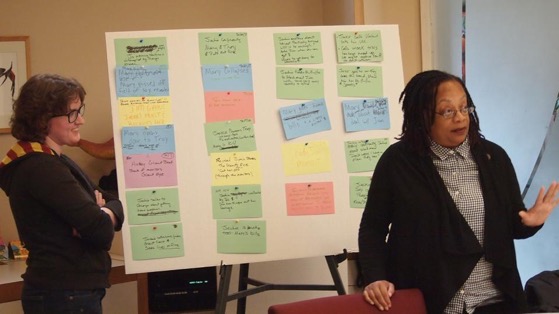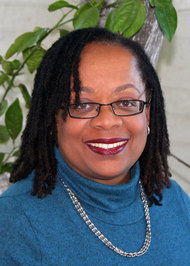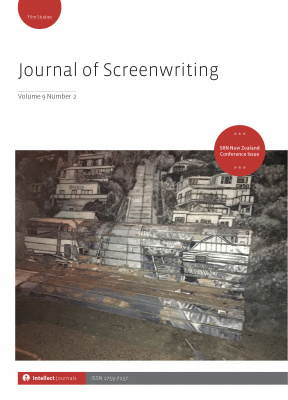This Sunday at 4pm join me at the DTLA (Downtown LA Film Festival)!
I’ll be moderating a panel on implicit bias in screenwriting. “Privileged Characters: How to recognize and avoid implicit bias in your screenwriting” will take place at the Regal Cinema at LA Live. Panelists will include Maria Escobeda, one of the Stephens MFA in TV and Screeenwriting’s favorite mentors, as well as representatives from the worlds of entertainment journalism, marketing and theme parks – all of whom need to understand this idea in order to reach – and succeed – with customers from all over the world. — Rosanne

Date/Time: Sun, October 27, 2019 @ 4:00 PM
Running Time: 60 Minutes
Location: Regal LA Live MEZZANINE
Panel Description
Privileged Characters: How to recognize and avoid implicit bias in your screenwriting
How do writers recognize and avoid implicit bias in their work? In this panel we review examples of how implicit bias infects popular shows and movies — even now in the wake of the Black Lives Matter, #MeToo and #TimesUp movement.
We’ll also learn about the tools and techniques available to combat implicit bias in the written word.
Finally, we’ll tackle the prickly question of writers who can authentically create characters and stories that are intrinsically about people who demographically different from them?
More Information
Panelists
Beverly Gray
Beverly Gray has spent her career fluctuating between the world of the intellect and show biz. As she was completing her doctorate in Contemporary American Fiction at UCLA, she surprised everyone (including herself) by taking a job with B-movie legend Roger Corman, for whom she helped develop 170 low-budget feature films. Following her Corman years, she covered the movie industry for The Hollywood Reporter. She has also published the best-selling Roger Corman: “Blood-Sucking Vampires, Flesh-Eating Cockroaches, and Driller Killers”, as well as “Ron Howard: From Mayberry to the Moon . . . and Beyond”. Currently, she teaches advanced online screenwriting workshops for UCLA Extension’s internationally-known Writers’ Program, and her popular twice-weekly blog, “Beverly in Movieland,” covers movies, moviemaking, and growing up Hollywood-adjacent. Her most recent book is “Seduced by Mrs. Robinson: How The Graduate Became the Touchstone of a Generation.”
Maria Escobedo
Maria Escobedo is a film and television writer with credits including “Grey’s Anatomy”, Hulu’s “East Los High” and the indie film “Rum and Coke”, which she wrote and directed. She’s developed movies and pilots for Lifetime, Disney Channel, and Nickelodeon. She also has written for animated kids’ TV, including “Dora the Explorer”, “Go Diego Go”, “Elena of Avalor”, “Special Agent Oso” and “Nina’s World”, which earned her a Humanitas Award nomination. Escobedo is currently writing for Amazon’s “If You Give a Mouse a Cookie”, Netflix’s “What-To-Doodles” and Nickelodeon’s “Santiago of the Seas”.
Hanala Sagal
Hanala Sagal, screenwriter-producer of “Elvis & Nixon” (Tribeca Film Festival 2016 Centerpiece), starred on “Shape Up L.A!” as Suzan Stadner (1985-2000.) Her brand is Comedy Wellness: Content for a Better Tomorrow and Funnier Today, trending on YouTube with 500M views and 400K subscribers. Hanala is in development on “Traumaland” (dark comedy, feature) based on her best-selling memoir “My Parents Went Through the Holocaust and All I Got Was This Lousy T-Shirt” featured in “The Last Laugh” starring Mel Brooks.
Donna Bonilla Wheeler
Donna Bonilla Wheeler is a Peruvian-American film + theatre writer/director who began her film career writing and directing for Walt Disney Productions Theme Parks. Her original screenplays have been selected as Academy Nicholl Fellowship semi finalist/quarter finalists, IFP No Borders, Austin 2nd Rounders, and Slamdance Script Labs, among others. She sold her experimental short about the creative process, “Mind’s Eye” at the Cannes film market. She received the Grand Jury Prize, Narrative Short for her dramedy film, “The Girl Next Door” at Mystic Film Festival, and her family comedy/mystery she wrote and directed, “Death of a saleswoman” has received global recognition at multiple festivals. Donna is a fiscally-sponsored 501c3 filmmaker, working in the Latinx, LGBTQ+ diversity spaces.
Kala Guess
Kala Guess is a marketing professional at Final Draft. She acts as both Contest Director for the Big Break Screenwriting Contest and Content Producer for the Final Draft blog and “Write On” podcast. As part of her focus on the customer experience, she produces engaging and insightful content for screenwriters and operates as a champion for emerging talent. Additionally, Kala is a driving force in Final Draft’s efforts for diversity and inclusivity in the entertainment industry. Previously, she worked as the marketing and publicity coordinator for an independent film and television studio in Hollywood. Kala has a decade of experience in various capacities in the entertainment industry.
Evette Vargas
Evette Vargas is an award-winning writer, director, producer and immersive storyteller. Named by the New York Times as an “Artist to Watch,” Vargas’ has produced series for Amazon, MTV, Bravo, DirectTV; and interactive content for Fast And Furious, Lord Of The Rings trilogy and Madonna. Vargas executive produced, wrote and directed her digital series Dark Prophet, starring Henry Rollins, which was in contention for two Emmys. Vargas sold her drama series, Muses, to TNT Super Deluxe. Vargas is creating a drama series for MGMTV with Marc Guggenheim and Rosario Dawson serving as executive producers. Vargas wrote The Current War VR Experience, a companion piece for the film, starring Benedict Cumberbatch. A proud member of the WGA, ATAS and PGA, Vargas was born in the Bronx and learned to tell stories at the dinner table where the imagination ruled. Vargas collects action figures, typewriters and shoes; has past lives as a DJ, a fashion designer and is a recovering New York City advertising Art Director.



![10 More On TV As Platform And Podium from “Why The Monkees Matter: Even 50 Years Later [Video] (52 seconds)](https://rosannewelch.com/wp-content/uploads/2019/10/monkees-popcon-2019-10.jpeg)





![22 Octavia Butler from The Sisterhood of Science Fiction – Dr. Rosanne Welch [Video] (46 seconds)](https://rosannewelch.com/wp-content/uploads/2019/10/scifi-rmw-cpp-22.jpeg)




